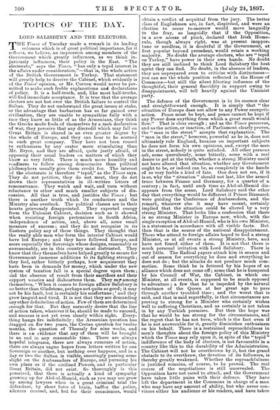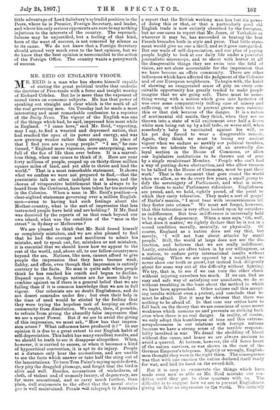TOPICS OF THE DAY.
LORD SALISBURY AND THE ELECTORS.
THE Times of Tuesday made a remark in its leading columns which is of great political importance, for it reflects, we believe, an impression among members of the Government which greatly influences, as we think in- juriously influences, their policy in the East. "The electorate," says the Times, "has only a tepid interest in the affairs under consideration,"—that is, the whole action of the British Government in Turkey. That statement will greatly help to deceive the Cabinet, which evidently is of the Times' opinion, or Mr. Curzon would never be per- mitted to make such feeble explanations and declarations of policy. It is a half-truth, and, like most half-truths, will find immediate acceptance. It is true that the average electors are not hot over the British failure to control the Sultan. They do not understand the great issues at stake, or the advantage that barbarism has so far gained over civilisation, they are unable to sympathise fully with a race they know so little of as the Armenians, they think the Greeks made fools of themselves by a rash declaration of war, they perceive that any discredit which may fall on Great Britain is shared in an even greater degree by the whole of Europe, and they can bear to be scorned in such great company. They have not been roused to enthusiasm by any orator more stimulating than Mr. Bryce, and they are afraid, quite justly afraid, of opposing their usual leaders on matters of which they know so very little. There is much more humility and readiness to follow among democracies than political philosophers usually give them credit for. The interest of the electorate is therefore "tepid," as the Times says. They do not petition, they do not meet, they do not drown their representatives in ill-written letters of remonstrance. They watch and wait, and turn without reluctance to other and much smaller subjects of dis- cussion. All that is true, and justifies the Times ; but there is another truth which its conductors and the Ministry also overlook. The political classes are in their hearts grievously disappointed. They expected energy from the Unionist Cabinet, decision such as it showed when resisting foreign pretensions in South Africa, independence of action, and, above all, some small measure of success ; and they do not recognise in its Eastern policy any of these things. They thought that the really able men who form the interior Cabinet would have led Europe ; and they have followed Europe, and more especially the Sovereign whose designs, reasonably or ,anreasonably, are in this country most distrusted. They know that they themselves have helped greatly to secure for Government immense additions to its fighting strength ; they feel, rather bitterly perhaps, bow acquiescent they have been in demands for money, which under the new system of taxation fall in a special degree upon them ; and the absence of result from their sacrifices and their support wearies and disheartens them. They sap among themselves, When it comes to foreign affairs Salisbury is no better than Gladstone, perhaps not quite so good; it may not be his fault, but is certainly his misfortune ; ' and they grow languid and tired. It is not that they are demanding any other definite line of action. Few of them are determined enough for that. But they earnestly desire that the line of action taken, whatever it be, should be made to succeed, and success is not yet even clearly within sight. Every- thing hangs fire indefinitely ; the Armenian question has dragged on for two years, the Cretan question for twelve months, the question of Thessaly for nine weeks, and there is no evidence that any of them will be brought to an end in any reasonable time. There are always hopeful telegrams, there are always rumours of action, there are always vague hopes from letters written by one Sovereign or another, but nothing ever happens, and in a day or two the Sultan is visible, sneeringly passing some slight on the Ambassadors of Europe, and pursuing his own plans as if the civilised Powers, and in particular Great Britain, did not exist. So thoroughly is this perceived, that there is actually a kind of sympathy growing up for Abd-ul-Hamid, such as you may see grow up among lawyers when in a great criminal trial the defendant, by sheer force of brain, baffles the ,police, silences counsel, and, but for their consciences, would obtain a verdict of acquittal from the jury. The better class of Englishmen are, in fact, dispirited, and were an election to occur to-morrow would move languidly to the fray, so languidly that if the Opposition, in a new access of pluck, declared that Irish Home- rule, though always right, was at present inoppor.. tune or needless, it is doubtful if the Government, at first popular beyond precedent, would retain a working majority. No doubt the average electors, who are "tepid on Turkey," have power in their own hands. No doubt they are still inclined to think Lord Salisbury the best agent they can find. No doubt, in the absence of leaders, they are unprepared even to criticise with distinctness— you can see the whole position reflected in the House of Commons—but still the silent filtering influence of the thoughtful, their general flaccidity in support owing to disappointment, will tell heavily against the Unionist party.
The defence of the Government is in its essence clear and straightforward enough. It is simply that "the situation of Europe does not allow to any Power energetic action. Peace must be kept, and peace cannot be kept if any Power does anything from which a great result would. flow." That is clear enough ; and as the Times perceives, and as the action, or inaction, of Parliament clearly proves,. the "man in the street" accepts that explanation. The "man in the street," however, powerful as he is, does not ultimately rule England, because on important subjects. he does not form his own opinions, and, except the man in the street, nobody is quite satisfied. All other persons ask, some querulously, some bitterly, some with a real desire to get at the truth, whether a strong Ministry could not have altered that situation, whether any Government ought to be, or indeed can be, so completely in the hands of so very feeble a kind of fate. One does not see, if it is so, why the " situation " should not last, like the armed truce between France and Germany, for a quarter of a. century ; in fact, until such time as Abd-ul-Hamid dis- appears from the scene. Lord Salisbury said the other day that everything would be different if Prince Bismarck were guiding the Conference of Ambassadors, and the remark, whatever else it may have meant, certainly implied that the situation could be altered by a very strong Minister. That looks like a confession that there is no strong Minister in Europe now, which, with the single exception of Abd-ul-Hamid, who is his own Minister,. is a statement in accordance with all visible facts. But then that is the source of the national disappointment. Those who attend to foreign affairs hoped to find a strong Minister, or at all events a strong Ministry, here, and have not found either of them. It is not that there is much personal irritation with Lord Salisbury. There is very little. The Radical papers attack him in season and out of season for everything he does and everything he does not do ; but the attacks do not produce much com- motion. Some think he is fettered by his hopes of an alliance which does not come off; some that he is hampered by his Council of War, the Cabinet, in which one Minister, at all events, is supposed to be much opposed to adventure ; a few that he is impeded by the natural reluctance of the Queen at her great age to pass through another troubled time ; and the worst that is said, and that is said regretfully, is that circumstances are proving to strong for a Minister who certainly wishes well to suffering Christians, and as certainly is not taken in by any Turkish promises. But then the hope was that he would be too strong for the circumstances, and the regret that he has not been, which is the fact even if he is not answerable for it, greatly diminishes enthusiasm on his behalf. There is a restrained reproachfulness in men's thoughts about the foreign policy of this Ministry which the Times may rely upon it, in spite of the "tepid" indifference of the body of electors, is not favourable in a country like this to the durability of the Administration. The Cabinet will not be overthrown by it, but the grand obstacle to its overthrow, the devotion of its followers, is thereby greatly weakened. Whether the reproachfulness is justified remains, of course, to be proved. The real course of the negotiations is still unrevealed. The Opposition have not cared to attack, and the Government have taken little pains with their defence. They have left the department in the Commons in charge of a man. who may have any amount of ability, but who never con- vinces either his audience or his readers, and have taken little advantage of Lord Salisbury's splendid position in the Peers, where he is Premier, Foreign Secretary, and leader, and where his only serious opponents are sure to say nothing injurious to the interests of the country. The reproach- fulness may be unjustified, but a feeling of that kind, born of the want of success, is not removed by silence as to its cause. We do not know that a Foreign Secretary should attend very much even to the best opinion, but we do know that the best opinion is unreconciled to the action of the Foreign Office. The country wants a pennyworth of success.



































 Previous page
Previous page